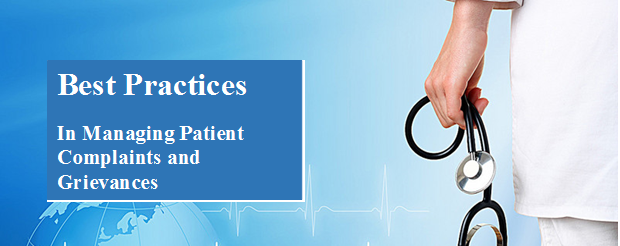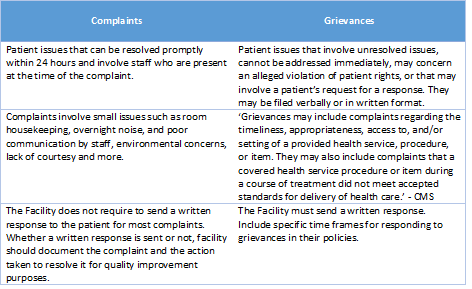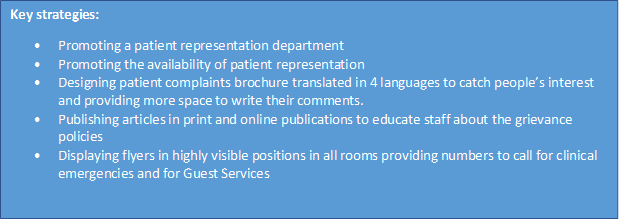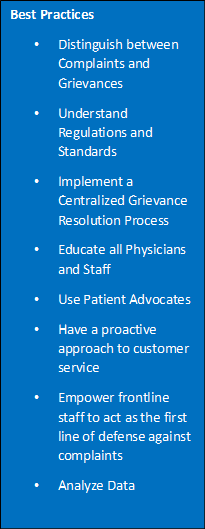By using this site you agree to our use of cookies. Please refer to our privacy policy for more information. Close
Best Practices In Managing Patient Complaints and Grievances
- By: Staff Editor
- Date: August 01, 2018
Compliance Webinars | Virtual Seminars for Professionals

Complaints and Grievances - Best Practices
Patients have the rights to file complaints and grievances when they are not satisfied with the treatment received. The healthcare organization should have a process to address and resolve them in a timely manner. The process should be effective and in compliance with the federal regulations and accreditation standards. By implementing an effective process, the healthcare organization reduces risks, enhances patient safety, and improves system or individual performance. Maintaining transparency in patient satisfaction data offers quality improvement opportunities.

THE ISSUE AT HAND:
Complaints and grievances should be addressed in a timely manner. However, understanding the key differences between the two is vital for the resolution process.
Distinguishing between Complaints and Grievances

EFFECTIVE WAYS TO MANAGE COMPLAINTS AND GRIEVANCES
A Proactive Approach to Feedback and Complaint Capture
‘Stanford Health Care (known as Stanford Hospital & Clinics until July 2014) (SHC; Stanford, California) implemented a robust process to measure and analyze all patient feedback to improve processes and patient satisfaction.’ – The Joint Commission Journal. The key strategies they implemented for sustained improvement in the complaint capture process are worth taking the clue.

‘Eliciting feedback from patients and engaging them in the highlight and address aspects of the care experience that need improvement, and to monitor performance with regard to meeting patient experience goals in the delivery of care.’ – Patient Experience Journal
Understanding key regulations in order to incorporate them into your processes
Click the links below to read the key regulations and guidelines pertaining to complaints and grievance management:
- CMS CoP Regulations: Patient rights §482.13
- OCR Section 1557
- TJC has complaint standard RI.01.07.01
- DNV PR 5
- Non-Discrimination Law Section 1557 of the ACA
You may wish to read the article 'Grievances and Complaints – An overview of the CMS, Joint Commission, DNV and OCR Standards Hospitals should know about'
.
Implementing a centralized complaints and grievance resolution process: CMS §482.13
CMS §482.13 requires that ‘the hospital must establish a process for prompt resolution of patient grievances and must inform each patient whom to contact to file a grievance.’
The Hospital’s governing body must be involved:
‘The hospital’s governing body must approve and be responsible for the effective operation of the grievance process, and must review and resolve grievances unless it delegates the responsibility in writing to a grievance committee.’

The patients must be notified:
Patients must be notified of their legal rights before or soon after admission. They must be informed of their rights to file grievances with regulatory agencies with complete information of whom to contact and the complete contact details.
Complaints should be captured:
By collaborating with various departments in the hospital, the patient concerns can be efficiently moved into a centralized process for complaint capture and resolution.
Developing policies and procedures:
Receipt of the complaint: The patient or family should receive an initial acknowledgement that the grievance has been received and that the matter will be investigated and will receive follow-up soon.
Compile facts: For speedy and smooth resolution, facts must be gathered by a series of interviews with patients, complainants, research of applicable regulations, policies, and procedures.
Resolution: Including timeframes for responding to grievances should be part of the policy. This information should be readily made available to surveyors if necessary.
Must be documented: Documentation of each step from filing the grievance to resolution is critical for quality improvement, risk management, and surveyors.
Written response: Hospitals must send a clear written response to the complainant with complete details of actions taken to investigate, the results of the investigation, the timeframes, and the completion date of the grievance process. Written responses are used as evidence in court. Writing the facts is critical.
Educate physicians and staff and empower them: All the physicians and frontline staff must be educated about the grievance process. They must understand how to distinguish between a complaint and a grievance and direct grievance to the relevant personnel. Train staff to take proactive steps to solve minor problems before they escalate. Empower them.
Analyze data and verify efficacy: Categorizing the complaints or grievances, analyzing them can greatly help in risk management and quality improvement. With the institution of a process, healthcare organizations can make continuous improvements rather than deteriorations.
HOW TO LEARN MORE:
Chief learning officer Sue Dill Calloway 'Grievances and Complaints: What Hospitals Should Know about the CMS, Joint Commission, DNV and OCR Standards?
You may also wish to browse through our list of webinars designed for life sciences personnel
.
Trending Compliance Trainings

By - Roger Cowan
On Demand Access Anytime

By - Doug Keipper
On Demand Access Anytime

By - Joy McElroy
On Demand Access Anytime

By - Carolyn Troiano
On Demand Access Anytime

By - Dr. Afsaneh Motamed Khorasani
On Demand Access Anytime



By - Michael Ferrante
On Demand Access Anytime


- Add to Cart
- Add to Cart
- Add to Cart
- Add to Cart
- Add to Cart
- Add to Cart
- Add to Cart
- Add to Cart
-
By: Miles HutchinsonAdd to CartPrice: $249
- Add to Cart
- Add to Cart
- Add to Cart
- Add to Cart
- Add to Cart
- Add to Cart
-
Add to CartSan Francisco, CA | Aug 6-7, 2020
-
Add to CartVirtual Seminar | Jul 16-17, 2020
-
Add to CartVirtual Seminar | Jun 18-19, 2020
-
Add to CartLos Angeles, CA | Aug 20-21, 2020
-
Add to CartVirtual Seminar | Jul 16-17, 2020
-
Add to CartVirtual Seminar | Jun 25-26, 2020
-
Add to CartVirtual Seminar | Jun 10, 2020
-
Add to CartVirtual Seminar | Jun 3-4, 2020
-
Add to CartVirtual Seminar | Jul 6-7, 2020
-
Add to CartSan Francisco, CA | Oct 22-23, 2020
-
Add to CartVirtual Seminar | Jul 9-10, 2020
-
Add to CartVirtual Seminar | Jun 3-4, 2020
-
Add to CartVirtual Seminar | June 3-4, 2020
-
Add to CartMiami, FL | Jul 29-31, 2020
-
Add to CartVirtual Seminar | Jun 17, 2020
-
Provider: ANSIAdd to CartPrice: $142
- Add to Cart
- Add to Cart
- Add to Cart
-
Provider: ANSIAdd to CartPrice: $120
-
Provider: ANSIAdd to CartPrice: $250
-
Provider: SEPTAdd to CartPrice: $299
- Add to Cart
-
Provider: Quality-Control-PlanAdd to CartPrice: $37
- Add to Cart
-
Provider: At-PQCAdd to CartPrice: $397
- Add to Cart
- Add to Cart
- Add to Cart
- Add to Cart








